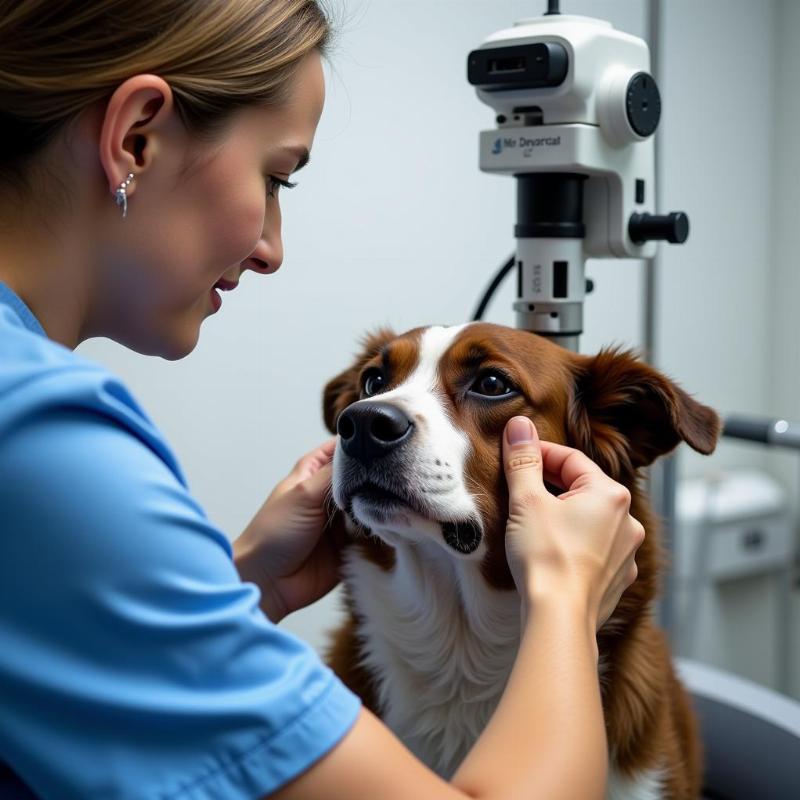Lid n lash for dogs is a search term that can encompass several different concerns. Are you worried about your dog’s eyelashes growing too long? Perhaps you’re dealing with irritated eyelids or even a more serious eye condition. Understanding the nuances of canine eyelid and eyelash health is crucial for responsible pet ownership in the US. This article will explore the common issues related to lid n lash in dogs, providing valuable insights and practical advice to help you ensure your furry friend’s ocular well-being.
Understanding Canine Eyelid and Eyelash Anatomy
Before delving into potential problems, it’s helpful to understand the basic anatomy of a dog’s eyelids and eyelashes. Just like humans, dogs have upper and lower eyelids that protect their eyes from debris and injury. Their eyelashes, while not as prominent as ours, serve a similar purpose. Knowing what’s normal can help you identify when something is amiss.
Common Lid and Lash Issues in Dogs
Several conditions can affect a dog’s eyelids and eyelashes. Some are relatively minor, while others can be quite serious. Let’s explore some of the most common issues:
Ingrown Eyelashes (Distichiasis)
Distichiasis occurs when eyelashes grow inward, rubbing against the cornea and causing irritation. This can lead to excessive tearing, squinting, and even corneal ulcers.
Eyelid Inflammation (Blepharitis)
Blepharitis is inflammation of the eyelids, often caused by allergies, infections, or underlying medical conditions. Symptoms include redness, swelling, itching, and discharge.
Eyelid Tumors
Tumors can develop on or around the eyelids, and while some are benign, others can be cancerous. Regular veterinary checkups are crucial for early detection.
Entropion and Ectropion
Entropion is a condition where the eyelid rolls inward, while ectropion is when it rolls outward. Both can cause irritation and require veterinary attention.
When to Seek Veterinary Care
If you notice any changes in your dog’s eyes, such as redness, swelling, discharge, or changes in eyelash growth, it’s essential to consult a veterinarian. Early diagnosis and treatment can prevent more serious complications.
Home Care for Minor Lid and Lash Issues
For minor irritation, your vet might recommend gently cleaning the area with a warm compress or a veterinarian-approved eye wash. Never use human eye drops on your dog without consulting a vet.
What can I do if my dog’s eyelashes seem too long?
While trimming a dog’s eyelashes is generally not recommended, in certain cases where the lashes are causing irritation, a vet may carefully trim or remove them. Never attempt this yourself as it can easily injure your dog’s eye.
Are there any specific breeds prone to lid n lash problems?
Yes, certain breeds, such as Cocker Spaniels, Poodles, and Bulldogs, are more prone to certain eyelid and eyelash issues due to their facial structure and genetics.
 Dog Eye Exam at the Vet
Dog Eye Exam at the Vet
Conclusion
Paying attention to your dog’s lid n lash health is a vital part of responsible pet ownership. By understanding the common issues and seeking timely veterinary care, you can help ensure your furry companion’s eyes stay healthy and comfortable. Regular checkups are essential, especially for breeds prone to eye problems. Remember, early detection and intervention are key to preventing serious complications.
FAQ
- How often should I clean my dog’s eyes? As needed. If your dog’s eyes are clean and healthy, no routine cleaning is necessary.
- Can allergies cause lid n lash problems in dogs? Yes, allergies can cause inflammation of the eyelids and surrounding tissues.
- What are the signs of an eye infection in a dog? Redness, swelling, discharge, squinting, and pawing at the eye.
- Is it safe to use human eye drops on my dog? No, never use human eye drops on your dog without consulting a veterinarian.
- What should I do if my dog’s eyelid is swollen? Contact your veterinarian immediately.
- Can entropion or ectropion be corrected? Often, surgery is required to correct these conditions.
- Are there any over-the-counter medications for dog eye problems? No, always consult with your veterinarian before giving your dog any medication, even over-the-counter ones.
Beautdogs.us is your trusted source for comprehensive and engaging information on dog care and companionship in the US. We specialize in providing expert advice on dog breeds, grooming, health, and training. Whether you’re a new dog owner or a seasoned pro, Beautdogs.us is here to help you navigate the joys and challenges of pet parenthood. Contact us for any questions or concerns: Email: [email protected], Phone: +1 501-555-7529. Connect with us today at Beautdogs.us!